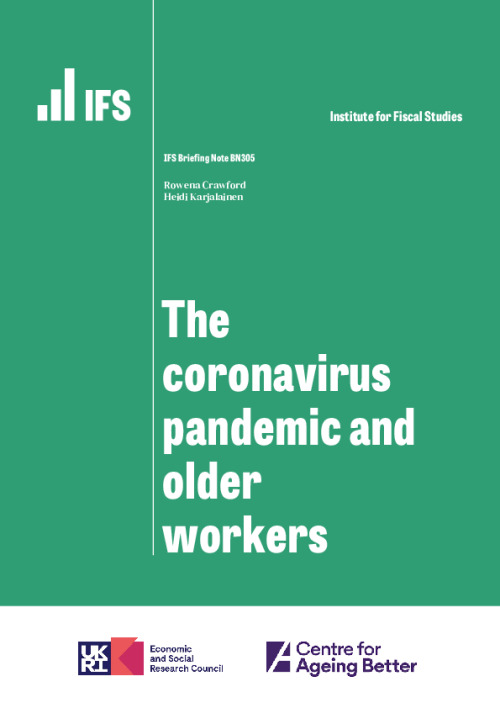Older workers are one group of people who are at risk of suffering serious and persistent consequences from the economic turmoil arising from the coronavirus pandemic.
Previous research has shown that unemployment shocks have persistent effects on the employment and incomes of older workers. In particular, older individuals who lose their jobs are less likely to secure re-employment, or to find a job on a similar wage to their previous earnings, than younger workers. Being unexpectedly out of work, or on lower wages, in the years leading up to retirement can have obvious negative implications for retirement resources. Individuals may not be able to save as they were intending, and may even be forced to start drawing on their accumulated savings sooner than planned if they bring forward their retirement. These difficulties could be exacerbated during the current COVID-19 crisis for those with pension savings held in equities, who will have seen the value of their retirement savings fall in the wake of falls in asset prices. Furthermore, in addition to these financial consequences, job loss and involuntary retirement are known to have adverse effects on health.
In this briefing note, we use data from the English Longitudinal Study of Ageing (ELSA) Covid-19 study to examine how the work activity of older individuals has been affected by the pandemic, how older workers’ concerns about their job security vary with their individual characteristics, and how retirement plans have already been affected by the crisis. The data were collected in June–July 2020, from a sample of nearly 6,000 individuals in their 50s and older.
Key findings
- Many workers have seen their employment disrupted by the coronavirus pandemic, and older workers are no exception. Nearly one in four employees aged 54 and over, who were working before the crisis, were on furlough in June–July, while among those still working, one in five were working fewer hours. Among the self-employed aged 54 and over, a third were not working, and among those who were working only one in five reported they could carry on their work as normal.
- A significant minority of older people working immediately before the crisis are now retired: 6% of those aged 66–70 and 11% of those aged 71 and older. While some may have been planning to retire around this time anyway, this was not true of half of those surveyed, and it is evidence that the current crisis has already caused some older workers to alter their retirement plans.
- The protection of their own health is an important consideration for older workers. Among those on leave in June–July, the advice to shield or concerns about their own health were the only reason(s) cited for nearly one in six individuals. It remains to be seen how the work status of these individuals changes as the government-supported furlough scheme ends.
- Many people who are clinically vulnerable to coronavirus have, however, continued working outside their homes. Whether this is because they enjoy their work, because they (rightly or wrongly) do not perceive themselves to be at high risk or because they cannot afford to not work is an important unknown.
- Concerns about job security are prevalent and not restricted to those who are on paid or unpaid leave. Among those in employment, 18% were somewhat worried about their job security, while 5% were very or extremely worried.
Those aged 54–59 are more worried about their job security than those at older ages. Those with a health condition or disability that limits the amount or type of work they can do are also particularly concerned, and may be one group worthy of particular attention.
- One in eight (13%) of older workers have changed their retirement plans as a result of the pandemic, with 8% planning to retire later and 5% planning to retire earlier. This shows that timing of retirement is an important means of adjusting to financial shocks for some older workers, but it also illustrates how disruptive this crisis has been to major life plans. As individuals are affected by the current crisis in different ways, we would expect some individuals to plan to retire earlier and others to plan to retire later as a result.
- Those currently on paid/unpaid leave are more likely than others to now be planning to retire earlier (5 percentage points more likely than those working not from home). This could be concerning if it represents individuals expecting to enter retirement earlier than they would like because they are discouraged about their prospects of finding new work. Those with more wealth are also more likely than those with less wealth to be planning to retire earlier as a result of the pandemic.
- The effect of stock market falls on pension wealth is one driver of later retirement plans: those with defined contribution (DC) pensions who reported a fall in their wealth are 6 percentage points more likely to be planning to retire later as a result of the pandemic than those with no DC pension wealth. Those working from home are 5 percentage points more likely than other workers to now be planning to retire later, which could suggest changes to working practices are making it easier or more appealing for older people to stay in work.










